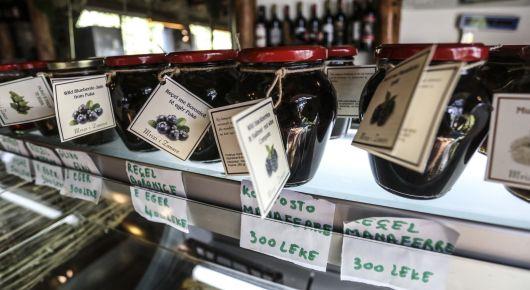Geographical indication products can help Albania align with EU standards

In Albania, FAO has used part of its efficiency savings to scale up the promotion of geographical indication products in light of the country’s European Union approximation process. Traditional and geographical indication products also have a high potential to advance rural development and rural livelihoods.
In this effort, FAO has partnered with the Polish Foundation Original to provide policy and knowledge support to the Ministry of Agriculture for enhanced national marketing standards by drawing on best international and European Union practices. Additionally, a synthesis guidebook on implementing subsectorial marketing standards, together with a series of geographical indication-specific trainings for experience and knowledge sharing, have all contributed to advance the country in aligning its agricultural practices to meet European Union marketing standards and support the implementation of a new law on geographical indications.
Throughout the European Union, traditional and geographical indication products are very popular among consumers. At the same time, they contribute to the development of rural areas and preserve the culinary heritage of the areas where they are produced.
To allow Albania to capitalize on this modality, FAO and Foundation Original raised producers’ and agricultural extension specialists’ awareness about the benefits, rules, and procedures related to the registration, protection, and distinction of such products. Through a series of trainings across the country, they’ve learned about the effective marketing, promotion and logistics, new technologies in commerce, such as e-commerce, and creation of producer groups and organizations.
“Due to the novel coronavirus pandemic, part of the trainings were conducted virtually, and Albanian officials and partners received further support through online meetings,” said Arben Kipi, Assistant FAO Representative.
Additionally, two workshops focused specifically on the sale of traditional products, where representatives of the foundation presented the Polish experience in using various distribution channels for selling and promoting traditional products. Participants learned how Poland adapted to EU regulations and how it developed its system of geographical indications (consisting of 43 registered products up to now) and traditional products.
“The in-person meetings with producers and partners during the first workshops organized in different parts of Albania were especially fruitful,” noted Dmitry Zvyagintsev, FAO policy officer. “It enabled speakers to present many examples of products registered within the European Union, the requirements to be met, and the benefits of registration as experienced by the producers in Poland, for instance, in the case of Jabłka Grójeckie (Grojec apples) or a sweet pastry, Rogal Świętomarciński (St. Martin's croissant).”
“The meetings also highlighted the richness and diversity of Albania’s regional and traditional products, which should be protected and promoted through such quality systems,” Zvyagintsev added.
The project was funded from FAO’s efficiency savings meant to support specific targeted activities at country level.
18 December 2020, Tirana, Albania
